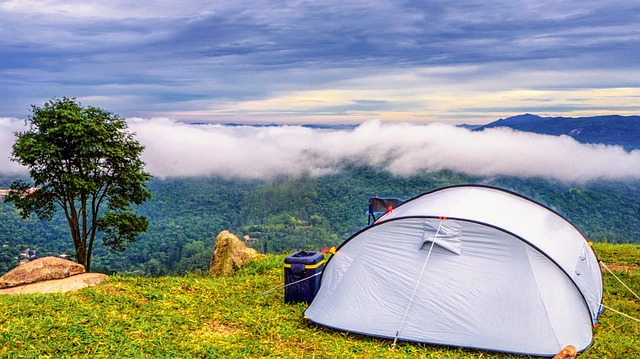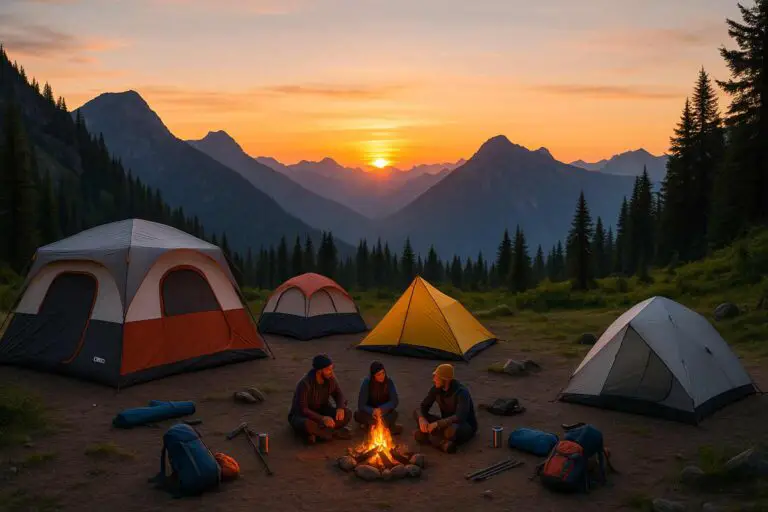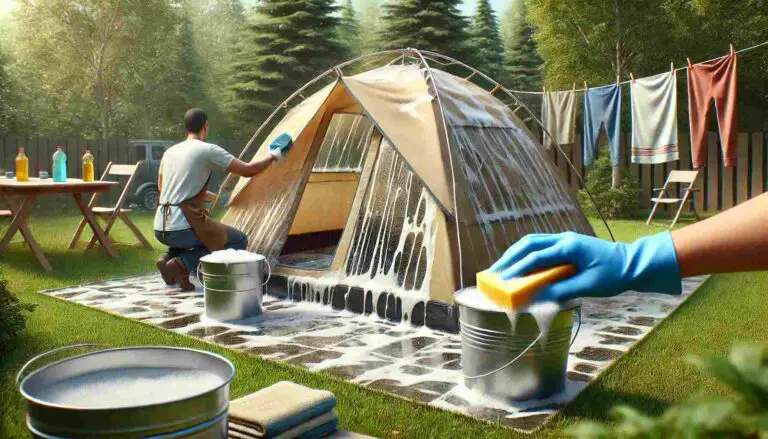When planning a camping trip, one of the most important decisions you’ll make is choosing the right tent. Your tent is your shelter from the elements, your home away from home, and the centerpiece of your camping experience. However, with so many different types and brands of tents on the market, it can be overwhelming to determine how much you should spend on a tent.
In this post, I’ll explore the different types of tents, factors to consider when determining your tent budget, and tent budget categories. I’ll also provide recommendations for the best tents in each budget category and tips for saving money on your tent purchase. By the end of this post, you’ll have the knowledge you need to make an informed decision and find the perfect tent for your camping needs. Let’s dive right in!
Types of Tents
When it comes to choosing a tent, the first step is to determine which type of tent is best suited for your needs. There are many different types of tents available, each designed for different camping situations. Here are 6 of the most common types of tents:
1-Backpacking Tents
Backpacking tents are designed to be lightweight and portable, making them ideal for hikers and backpackers who need to carry their tent with them. They are typically smaller in size, with limited headroom, and are designed to be set up quickly and easily.
2-Car Camping Tents
Car camping tents are larger and more spacious than backpacking tents and are designed for use at established campsites. They are typically heavier and bulkier than backpacking tents but offer more features, such as a standing room, multiple doors and windows, and room dividers.
3-Four-Season Tents
Four-season tents are designed to withstand extreme weather conditions, including high winds, heavy snow, and intense cold. They are typically made of heavier materials and are designed to provide superior insulation and protection from the elements.
4-Family Tents
Family tents are designed for larger groups and families and offer more living space than other types of tents. They often have multiple rooms and dividers, making them ideal for families with children or groups of friends.
5-Pop-up Tents
Pop-up tents are designed to be set up quickly and easily, without the need for poles or complicated instructions. They are lightweight and portable, making them ideal for festivals and other events where you need to set up and take down your tent quickly.
6-Rooftop Tents
Rooftop tents are designed to be mounted on the roof of your car, truck, or SUV. They are typically more expensive than other types of tents but offer the convenience of being able to set up camp anywhere your vehicle can take you.
Each type of tent has its own advantages and disadvantages, depending on your camping needs. When choosing a tent, consider the type of camping you’ll be doing, the size of your group, and the features you need to make your camping experience comfortable and enjoyable.
Related: Understanding the Basic Components of a Tent
Factors to Consider When Determining Tent Budget
Determining how much to spend on a tent can be challenging, as it will depend on several factors. Here are 5 of the key factors to consider when determining your tent budget:
1-Frequency of use
If you plan to use your tent frequently, it may be worth investing in a higher-quality tent that will last longer and provide better protection from the elements. However, if you only plan to use your tent occasionally, a lower-priced option may be more appropriate.
2-The number of people:
The size of your tent will depend on the number of people who will be using it. Larger tents with more features will generally cost more than smaller, simpler tents. It’s important to choose a tent that provides enough space for everyone in your group to sleep comfortably.
3-Durability and materials
Higher-quality tents are typically made with stronger, more durable materials that can withstand wear and tear over time. They may also offer features like reinforced seams, waterproof coatings, and heavy-duty zippers. These features can make a significant difference in the longevity of your tent.
4-Weather resistance
If you plan to camp in areas with extreme weather conditions, you’ll want a tent that is designed to provide maximum protection from the elements. Tents with features like waterproof coatings, durable rainfly, and strong poles will generally be more expensive but can provide the necessary protection in harsh weather conditions. (Learn the truth about tent waterproofing)
5-Weight and portability
If you plan to hike or backpack with your tent, weight, and portability will be important factors to consider. Lightweight tents that are easy to pack and carry will generally be more expensive than heavier, bulkier tents.
Tents can come with a wide range of additional features, such as multiple doors and windows, built-in storage pockets, and room dividers. These features can add convenience and comfort to your camping experience, but they will also increase the price of your tent. When choosing a tent, it’s important to compare the features of different models and brands to determine which features are most important to you and which models offer the best value for your budget. Don’t forget to factor in any additional costs, such as tent accessories or shipping fees, when comparing prices.
Tent Budget Categories
Once you’ve determined the factors that will influence your tent budget, it’s helpful to have an idea of the different budget categories for tents. Here are three main categories to consider:
- Budget Tents ($): Budget tents are a great option for occasional campers who want an affordable tent that will get the job done. These tents are typically made with lower-quality materials and may be less durable than higher-priced options. They may also be smaller and offer fewer features, but can still provide comfortable sleeping space for one or two people.
- Mid-Range Tents ($$): Mid-range tents offer a balance of affordability and quality. They are generally made with higher-quality materials and offer more features and space than budget tents. These tents may be suitable for families or groups who plan to camp several times a year.
- High-End Tents ($$$): High-end tents are designed for serious campers who want the best possible camping experience. These tents are made with top-quality materials and offer advanced features such as multiple rooms, vestibules, and specialized ventilation systems. They also provide maximum protection from harsh weather conditions. High-end tents are the most expensive but can be a great investment for avid campers who want a long-lasting and comfortable shelter for their camping adventures.
When choosing a tent, it’s important to consider not only the initial cost but also the long-term value. A high-quality tent that lasts for many years may end up being a better investment than a lower-priced option that needs to be replaced frequently. Consider your camping needs and budget carefully to determine the best tent for you.
Best Tents for Each Budget Category
Here are some recommendations for the best tents in each budget category:
Budget Tents ($)
- Coleman Sundome Tent – The Coleman Sundome Tent is a popular choice for budget-conscious campers. It’s easy to set up, provides good weather protection, and has a spacious interior. It’s available in a variety of sizes, making it suitable for couples or small families.
- ALPS Mountaineering Lynx Tent – The ALPS Mountaineering Lynx Tent is another great budget option. It’s lightweight, easy to set up, and offers good weather protection. It has a durable design and comes in a range of sizes, from one to four-person models.
- Wenzel Alpine Tent – The Wenzel Alpine Tent is a simple yet effective tent that’s great for occasional campers. It’s easy to set up, provides good ventilation, and has a spacious interior. It’s available in a two or three-person model.
Mid-Range Tents ($$)
- REI Co-op Half Dome 2 Plus Tent – The REI Co-op Half Dome 2 Plus Tent is a versatile option for camping and backpacking. It’s lightweight, has a spacious interior, and provides excellent weather protection. It also has plenty of convenient features, such as interior pockets and a gear loft.
- Marmot Tungsten UL Tent – The Marmot Tungsten UL Tent is a durable and lightweight option that’s great for backpacking. It’s easy to set up, has a spacious interior, and provides excellent weather protection. It also has features like a gear loft and footprint.
- Kelty Trail Ridge 4 Tent – The Kelty Trail Ridge 4 Tent is a great option for families or groups. It’s easy to set up, has a spacious interior with room dividers, and provides excellent weather protection. It also has plenty of convenient features like a gear loft and multiple doors and windows.
High-End Tents ($$$)
- Big Agnes Copper Spur HV UL2 Tent – The Big Agnes Copper Spur HV UL2 Tent is a lightweight, high-performance tent that’s great for backpacking. It’s easy to set up, has a spacious interior, and provides excellent weather protection. It also has convenient features like a gear loft, storage pockets, and multiple doors.
- NEMO Equipment Dragonfly Tent – The NEMO Equipment Dragonfly Tent is another lightweight and high-performance option for backpackers. It’s easy to set up, has a spacious interior, and provides excellent weather protection. It also has convenient features like gear pockets and a light pocket.
- The North Face Mountain 25 Tent – The North Face Mountain 25 Tent is a durable and high-performance tent that’s great for extreme weather conditions. It’s easy to set up, has a spacious interior, and provides excellent weather protection. It also has features like gear loops, vestibules, and multiple doors and windows.
Tips for Saving Money on Tents
Here are some tips for saving money on your tent purchase:
- Shop sales and discounts: One of the easiest ways to save money on a tent is to wait for sales or discounts. Many outdoor retailers offer seasonal sales on camping gear, including tents. You can also check for discounts on websites like Amazon or REI Outlet.
- Buy used or refurbished tents: Buying a used or refurbished tent can be a great way to save money. Websites like Craigslist, eBay, and Gear Trade offer used tents at a lower price. You can also check with outdoor gear rental companies, which often sell their used gear at a discount.
- Consider renting a tent: If you only plan to use your tent for a short period of time, renting a tent can be a cost-effective option. Many outdoor gear rental companies offer tents for rent, which can be a great way to try out a tent before purchasing one.
- Look for package deals: Many outdoor retailers offer package deals that include a tent, sleeping bags, and other camping gear. These packages can be a great way to save money on your camping gear overall.
- Comparison shopping: Before making a purchase, be sure to compare prices from different retailers. You can also compare the features of different tents to determine which offers the best value for your budget.
- Maintenance and care: Taking care of your tent can help prolong its lifespan and save you money in the long run. Be sure to properly store and clean your tent after each use, and repair any small tears or holes as soon as possible.
Conclusion
Choosing the right tent for your camping needs is an important decision that can greatly impact your camping experience. By considering factors like the type of camping you’ll be doing, the size of your group, and the features you need, you can determine how much to spend on a tent.
There are many different types and brands of tents available, each with its own advantages and disadvantages, and by choosing a tent that fits your budget, you can enjoy a comfortable and enjoyable camping experience. Whether you’re a budget-conscious camper looking for an affordable tent or an avid camper looking for a high-end tent with advanced features, there’s a tent out there for everyone.
If you follow tips for saving money on tents, you can also find a high-quality tent that fits within your budget. Happy camping!







